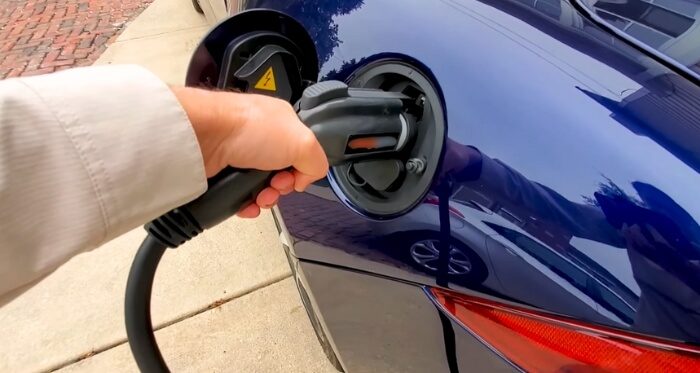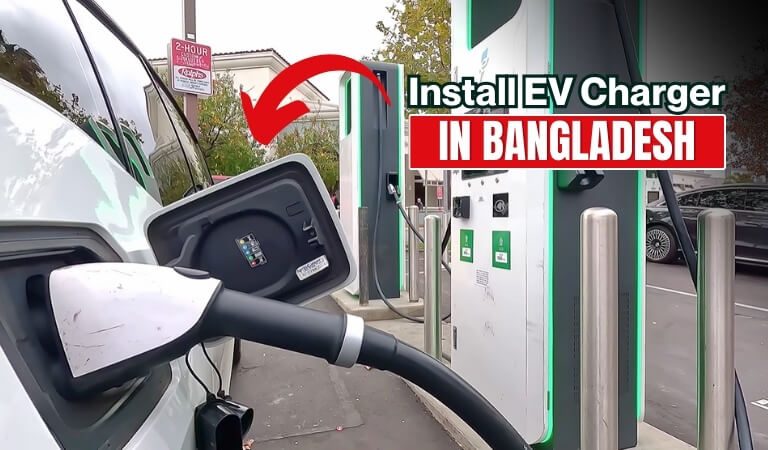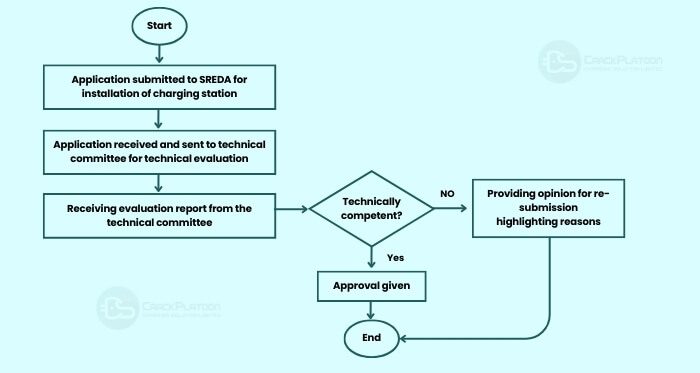Electricity is a form of power that has less contribution to the carbon emission of the global environment. That makes them an eco-friendly option. For that reason, the electric vehicle (EV) is growing a wider popularity among worldwide policymakers to adopt as the future of transportation.
The govt. of Bangladesh also adopted these forms of transport in their bigger plans. As they declared to reduce 21.85% of their carbon emission by 2030 in the UN Climate Change Conference UK 2021. This means the EVs are in the bigger plan of Govt of Bangladesh, so the question “Do I need a permit to install EV charger in Bangladesh?” is essential for the buyers and users of EVs.
Yes, you will have to get permission from the Sustainable and Renewable Energy Development Authority (SREDA), which is governed by the Power Division, Ministry of Power, Energy and Mineral Resources (MPEMR). A legal application towards the chairman of SREDA is needed to get the permission.
Crackplatoon CSL has introduced the EV charger setup widely in Bangladesh. Interesting info isn’t it? Now we’ll dive into installing an EV charger in Bangladesh, discussing permits, regulations, and standards. Join us on this journey to understand how to bring EV charging to your doorstep.
The Emergence of EVs in Bangladesh
The emergence of electric vehicles (EVs) in Bangladesh has been nothing short of remarkable since 2019. The nation has witnessed a surge in spirit for EVs, driven by rising fuel costs and environmental consciousness.
Policies have played a pivotal role in shaping this evolution. With clear guidelines like the Automobile Industry Development Policy 2021 and the Electric Vehicle Registration & Operation Policy 2023, Bangladesh has highlighted the significance of EVs for its future. Collaboration between various ministries and agencies signals a coordinated effort.
Bangladesh’s strides in the EV sector have garnered international recognition, with Cassetex receiving accolades at the World CleanTech Awards in 2023. As Bangladesh continues its electrification journey, the future looks promising for EVs in the country.
What is a Home EV Charger in Bangladesh?
A home EV charger is a private infrastructure set up by electric vehicle (EV) owners or a specific group of EV users for their exclusive use. It’s designed to recharge EVs conveniently at home and is not open to the public.

Typically, it operates on the standard household electricity tariff. However, if it serves more than three different EV owners and has a separate meter, it may be subject to the battery charging tariff specified by BERC (Bangladesh Energy Regulatory Commission).
Home EV chargers require sufficient space for vehicle charging, entry, and exit, and in some cases, multi-storied lift-included charging infrastructure may be installed to accommodate the charging needs of the EV owners or users within a residential setting.
The Public EV Charging Station In Bangladesh
In Bangladesh, the emergence of public EV charging stations has become a pivotal development in the electric vehicle landscape. These stations are strategically located at government organizations, housing associations, shopping malls, office buildings, restaurants, hotels, and petrol pumps.
Primary Aim
This aims to cater to the needs of more than three users or user groups. To set up these public charging stations, individuals or entities need a trade license from the local government and technical certification to ensure they meet safety and performance standards.
Charging Standards
The government extends its support to these public charging stations, making them eligible for various assistance programs. These stations offer flexibility for four-wheeler-electric vehicles with charging connectors like CCS (Combined Charging System), CHAdeMO, and Type-2 AC.
This will provide different power options to suit the diverse needs of EV users. As Bangladesh’s EV infrastructure continues to grow, public charging stations play a pivotal role in promoting electric mobility and reducing carbon emissions.
Do I Need a Permit to Install the EV charger in Bangladesh?
Yes, you do need a permit to install an EV charger in Bangladesh. The process is governed by specific regulations and requires adherence to the Bangladesh Electricity Distribution Code.

Additionally, approval from relevant authorities, including SREDA is essential. It is crucial to know the requirements and compliance factors for successful permit acquisition. Here we briefly explain these factors.
Compliance with the Electricity Distribution Code
The installation must meet the Bangladesh Electricity Distribution Code standards. The regular audits will ensure ongoing compliance. A yearly check by electricity distribution licensees is mandatory to fulfill the criteria.
Application to SREDA
Submission of the application form to SREDA for installation approval, which can be downloaded from the official SREDA website. The application should detail your experience and project specifics.
Also, attach the necessary documents as per Annex-2 related to the connection of electricity. This also be found in the circular of SREDA. Read these carefully and ensure to provide all the necessary documents for a seamless EV charger setup.
Project Specifics and Technical Details
Detailed descriptions of the EV charging stations with all the information on technical aspects need to be included with the application. Ensure to provide information on utilities, workforce, and organizational structure. Make sure to provide information about the estimated capital, investment sources, and completion timelines.
Location and Demand Analysis
Need to submit information about the specification of the location and the proximity to existing stations nearby. For that, conduct a market survey to demonstrate demand and need. A no-objection letter from neighboring charging stations is required also.
Legal and Safety Compliance
Ensure the EV charging station meets all safety and environmental regulations. Include electrical safety material descriptions and fire safety measures. Attach ownership proof or relevant agreements for the installation site.
Electricity Connection Application
There is another form to fill out for a smooth process of the permission. That is related to the Electricity connection application. Fill up with all necessary information, this can vary regarding the service provider your company uses.
Adherence to Safety Standards
The IEC standards and ISO requirements are the baseline for an EV charging station in Bangladesh. Get used to it and make sure that fulfilling all the criteria they want. Also, safety protocols like overload protection, lightning protection, and earthing protection are needed to run the EV charger setup.
Documentation for Electricity Connection
The relevant documents needed for the EV charger installation are national ID, land ownership documents, and technical certifications. Ensure to provide these documents. Also, technical certifications for EV charging stations are mandatory for installing new EV chargers.
Layout and Safety Systems
Prepare a layout plan for the charging station and highlight all electric safety systems. Make sure to obtain all certifications and reports on safety systems, insulation, and design specifications. These are also essential for smooth EV charger installation in Bangladesh.
Declaration and Submission
At last, a declaration of the accuracy of the information needs to be provided and a pledge to adhere to the Electric Vehicle Charging Guideline. Also, an agreement paper for not to transfer rights or liabilities without government approval. With completion of all these procedures sign the application form, including the date and your designation.
These are the compliance-related factors one should be mindful of for a smooth permit process, to install an EV charger in Bangladesh. Also, proper adherence to guidelines and thorough preparation of the application are key to obtaining the necessary permit.
Some Common Permit Obstacles You May Face
Installing an EV charger in Bangladesh can be a complex process, which has various permit obstacles. These common challenges can hamper the smooth permission process. That’s why knowing these is important for an applicant who wants to install an EV charging station in Bangladesh. Here’s a breakdown of some typical permit obstacles you might encounter.

Land Ownership and Usage Rights
A secure land rights can be a challenging issue for installing an EV charger. Conflicts over land ownership or lease agreements often delay permits. Ensure all legal documentation is clear and undisputed.
Compliance with Electrical Standards
Adhering to Bangladesh’s stringent electrical standards is crucial. Failure to meet these standards often leads to permit denials. Regularly consult the Bangladesh Electricity Distribution Code for updates.
Environmental and Safety Regulations
Environmental impact assessments are mandatory. Non-compliance with safety and environmental guidelines can halt your project. Rigorously follow national environmental and safety protocols.
Local Government Approvals
Local government permissions can be a significant hurdle. Delays often occur due to bureaucratic processes or unclear guidelines. Maintain open communication with local authorities and understand their specific requirements.
Infrastructure Compatibility
Infrastructure incompatibility is a common issue. The existing electrical grid may not support the new EV charging station. Thoroughly assess the local infrastructure’s capacity and plan accordingly.
These obstacles can hamper the process, it requires patience, thoroughness, and a deep understanding of both local and national regulations to outcome these. By anticipating and preparing for these challenges, you can streamline the process of installing an EV charger in Bangladesh.
The Penalties for Violating the Permit
Any violation of permit regulations for EV charger installation in Bangladesh carries significant penalties. As an EV charger supplier in Bangladesh, it’s essential to understand these repercussions to avoid legal complications. Let’s dive into the key penalties associated with permit violations.
Monetary Fines
A hefty fines await for the violators, often calculated based on the severity of the breach. These fines are imposed to deter non-compliance and ensure adherence to regulations. Timely compliance with permit requirements is crucial to avoid such financial penalties.
Suspension of Operations
Non-compliant installations can lead to an immediate suspension of operations. This suspension remains until the violations are rectified. Regular audits and compliance checks can prevent such disruptions.
Legal Actions and Prosecution
Severe violations may result in legal action against the EV charger supplier. This could lead to prosecution and court proceedings. Adhering to all legal and safety standards is imperative to avoid legal consequences.
Damage to Reputation
If there are any legal issues they can tarnish the reputation of an EV charger supplier. Such reputational damage can lead to loss of business and trust. Upholding high standards in installations and operations is key to maintaining a positive reputation.
These are some of the rule-violating ways that one can get penalties in Bangladesh. Being mindful of them will ensure the smooth process of getting permission for EV charger setup in Bangladesh.
Final Thought
Our inquiry for the question ‘Do I Need a Permit to Install the EV Charger in Bangladesh?’ ends while knowing the complexities of the process in this region. This process requires meticulous attention to detail, especially in filling out the application to SREDA. Accuracy in providing technical details, location specifics, and compliance with safety and environmental standards cannot be overstated.
Should there be any errors in the application, prompt correction is essential to avoid delays. The steps for correction involve communicating with the relevant authorities and submitting the necessary revised information.
Failing to do so or making errors in the application can lead to serious consequences, such as permit denial or legal complications. Therefore, thoroughness in the application process is not just recommended; it’s a critical component in successfully installing an EV charger in Bangladesh.
